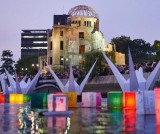April 9, 2016
Foreign Ministers of the G7 countries meet this weekend (April 10-11) in Hiroshima in preparation for the G7 Summit to take place in Japan in May 26-27.
The meeting, which will take place at the International Conference Centre in the Hirosima Peace Park, will include the Foreign Ministers of Japan, the United States, the United Kingdom, France, Germany, Italy and Canada, along with the President of the European Council and the President of the European Commission.
It will include a special ceremony with the foreign ministers laying flowers at the cenotaph honouring victims of the nuclear bomb dropped on the city during World War II. About 80,000 people were killed instantly when the Enola Gay, a US B-29 bomber, dropped a 15-kilotonne nuclear bomb on Hiroshima on the morning of 6 August 1945. More than 60,000 others died from their injuries and exposure to radiation by the end of the year.
U.S. Secretary of State John Kerry, who will particpate in the meeting and the ceremony, will be the highest ranking U.S. official to ever visit the nuclear memorial, and could pave the way for a visit by President Obama later this year. See John Kerry to make historic visit to Hiroshima Memorial, The Guardian, April 5, 2016.
It will also be the first time that serving foreign ministers from the United Kingdom and France – two other possessers of nuclear weapons – have been to the peace memorial park.
The Basel Peace Office sent a message yesterday to the foreign ministers participating in the Hiroshima meeting urging them to use the occasion of their visit to highlight the humanitarian impact of nuclear weapons and to commit to the global abolition and elimination of nuclear weapons.
'We urge you to acknowledge the catastrophic humanitarian impact of any use of nuclear weapons and the importance of indefinitely extending the 70-year practice of the non-use of nuclear weapons,' says Dr Andreas Nidecker, President of the Basel Peace Office and International Councillor for the International Physicians for the Prevention of Nuclear War.
'We also call on you to announce the start of multilateral negotiations to fulfill the legal, political and moral imperative to prohibit and eliminate nuclear weapons globally. Your experience in Hiroshima witnessing the legacy of nuclear-weapons-use, demands no less,' says Dr Nidecker.
Basel Peace Office also sent the G7 Foreign Ministers A Nuclear-Weapon-Free World: Our Common Good, a joint statement endorsed by parliamentarians, mayors and religious leaders from around the world which was adopted in Hiroshima on August 6, 2015, and which makes a similar call on governments to prohibit and eliminate nuclear weapons.
'As parliamentarians, mayors and religious leaders we join together to highlight the continuing risks of a nuclear catastrophe - whether by accident, miscalculation or intent – and the moral and security imperative to achieve nuclear abolition...We call upon world leaders to commit to nuclear abolition and to replace nuclear deterrence with shared security approaches to conflicts. We further urge states to advance a nuclear weapons convention or framework of agreements that eliminate nuclear weapons.'
Excerpt from A Nuclear-Weapon-Free World: Our Common Good
The Foreign Ministers meeting comes just one week prior to a track-two Framework Forum meeting of governments in Geneva organised by the Basel Peace Office on the 'Issues and proposals to take forward nuclear disarmament.' The roundtable, which will include ambassadors from the U.S., United Kingdom and approximately 20 other governments, will focus on proposals for nuclear disarmament being discussed at the UN Open Ended Working Group (OEWG), which will hold its next sessions from May 2-13, and the Conference on Disarmament, which will resume its sessions on May 16.
The Basel Peace Office has submitted a working paper for the May OEWG entitled Building the Framework for a Nuclear-Weapon-Free World. See Basel Peace Office and the new UN disarmament body.
